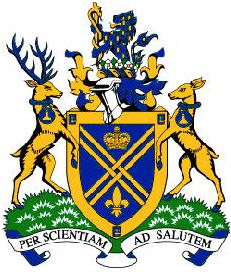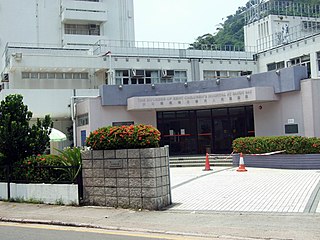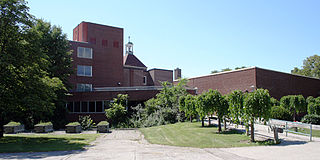Mount Sinai Hospital (MSH) is a hospital in Toronto, Ontario, Canada. Mount Sinai is part of Sinai Health. Sinai Health was formed through the voluntary amalgamation of Mount Sinai Hospital and Hennick Bridgepoint Hospital on January 22, 2015.
University Health Network (UHN) is a public research and teaching hospital network in Toronto, Ontario, Canada. It is the largest health research organization in Canada and ranks first in Canada for total research funding. It was named Canada's top research hospital by Research Infosource from 2015 to 2021. The network includes three acute care hospitals – Toronto General Hospital, Toronto Western Hospital, Princess Margaret Cancer Centre – the Toronto Rehabilitation Institute, and The Michener Institute, a post-secondary institution granting diplomas and certificates in health sciences and leadership. In the 2019-2020 fiscal year, there were over 39,000 acute inpatient stays and close to 121,000 emergency department visits across the three acute care hospitals.

The Toronto General Hospital (TGH) is a major teaching hospital in Toronto, Ontario, Canada and the flagship campus of University Health Network (UHN). It is located in the Discovery District of Downtown Toronto along University Avenue's Hospital Row; it is directly north of The Hospital for Sick Children, across Gerrard Street West, and east of Princess Margaret Cancer Centre and Mount Sinai Hospital. The hospital serves as a teaching hospital for the University of Toronto Faculty of Medicine. In 2019, the hospital was ranked first for research in Canada by Research Infosource for the ninth consecutive year.

Sunnybrook Health Sciences Centre (SHSC), commonly known as Sunnybrook Hospital or simply Sunnybrook, is an academic health science centre located in Toronto, Ontario, Canada. It is the largest trauma centre in Canada and one of two trauma centres in Toronto, the other being St. Michael's Hospital. Sunnybrook is a teaching hospital fully affiliated with the University of Toronto. The hospital is home to Canada's largest veterans centre, in the Kilgour Wing and the George Hees, which cares for World War II and Korean War veterans.

The Michener Institute of Education at UHN, or simply Michener, is a specialist post-secondary institution in Toronto, Ontario, Canada. Based in Downtown Toronto and governed by the University Health Network (UHN), Canada's largest funded health care organization, Michener was founded by Diana Michener Schatz as the Toronto Institute of Medical Technology in 1958 with a pilot program in Medical Laboratory Technology at the Toronto General Hospital. After years of expansion through more programs offered, the institute was relocated to its present campus in 1972 at 222 St. Patrick Street and was renamed "The Michener Institute" after Schatz's father, Roland Michener in 1990. The institute is funded by the Ontario Ministry of Health.

Vancouver General Hospital is a medical facility located in Vancouver, British Columbia. It is the largest facility in the Vancouver Hospital and Health Sciences Centre (VHHSC) group of medical facilities. VGH is Canada's third largest hospital by bed count, after Hamilton General Hospital, and Foothills Medical Centre.

Vancouver Hospital and Health Sciences Centre (VHHSC) is an acute care hospital affiliated with the University of British Columbia and located in Vancouver, British Columbia. The VHHSC is the second largest hospital in Canada, with 1,900 beds and nearly 116,000 patients each year. VHHSC employs 9500 staff and utilizes 1000 volunteers. As of 2005, the hospital's annual budget is $463 million. It is managed by Vancouver Coastal Health.

The Shirley Ryan AbilityLab, formerly the Rehabilitation Institute of Chicago (RIC), is a not-for-profit nationally ranked physical medicine and rehabilitation research hospital based in Chicago, Illinois. Founded in 1954, the AbilityLab is designed for patient care, education, and research in physical medicine and rehabilitation (PM&R). The AbilityLab specializes in rehabilitation for adults and children with the most severe, complex conditions ranging from traumatic brain and spinal cord injury to stroke, amputation and cancer-related impairment. Affiliated with Northwestern University, the hospital is located on Northwestern’s Chicago campus and partners on research and medical efforts.

The Duchess of Kent Children's Hospital at Sandy Bay is a pediatric hospital in Sandy Bay on Hong Kong Island in Hong Kong.
GF Strong Rehabilitation Centre is the largest rehabilitation hospital in British Columbia. It is located in the South Cambie neighbourhood of Vancouver.
MedStar National Rehabilitation Network is located in Washington, D.C., and specializes in treating persons with physical disabilities, including spinal cord injury, brain injury, stroke, arthritis, amputation, multiple sclerosis, post-polio syndrome, orthopedic, and other neurological conditions. National Rehabilitation Hospital was founded in 1986 by Edward A. Eckenhoff, and is a member of the MedStar Health system, the Washington, D.C.-Baltimore region's largest non-profit healthcare organization.

St. John's Rehab, part of Sunnybrook Health Sciences Centre, is solely dedicated to specialized rehabilitation. As the site of Canada’s only dedicated organ transplant rehabilitation program and Ontario's only dedicated burn rehabilitation program, the hospital develops individually customized inpatient and outpatient rehabilitation services.

Mary Free Bed Rehabilitation Hospital is a 167-bed acute care inpatient rehabilitation hospital for children and adults who have experienced a brain injury, spinal cord injury, stroke, amputation, or other injury or illness requiring physical rehabilitation.
Magee Rehabilitation Hospital, part of Jefferson Health, founded in 1958, is a 96-bed specialty medical rehabilitation hospital providing physical and cognitive rehabilitation services. Magee's flagship facility is located in Center City Philadelphia. In addition to the main campus that offers comprehensive services for spinal cord injury, brain injury, stroke, orthopaedic replacement, amputation, pain management and work injury, Magee provides an expanding outpatient network serving the surrounding communities. In 1985, Magee's brain injury rehabilitation program became the first in the nation to be accredited by the Commission on the Accreditation of Rehabilitation Facilities. Magee partnered with Jefferson Hospital to create one of the nation's 14 federally designated centers for spinal cord injury rehabilitation. Magee has been rated one of America's leading rehabilitation hospitals by U.S. News & World Report. Magee provides treatment to more than 5,000 individuals annually. Magee is authorized to treat wounded military personnel returning from war. Magee is not an Obligated Group Affiliate.
The Canadian Spinal Research Organization (SCRO) is a nationally registered charity whose mission is to improve the physical quality of life for persons with spinal cord injuries (SCI) and related neurological deficits, as well as to reduce the number of spinal cord injuries through awareness and prevention programs.
Michael Fehlings is a Canadian neurosurgeon based at Toronto Western Hospital in Toronto, Ontario, Canada. Dr. Fehlings specializes in complex spine surgery with a special interest in traumatic and non-traumatic spinal cord injury and spine oncology. He mainly focuses on preclinical and clinical translational research related to enhancing repair and regeneration of the injured central nervous system. He holds many positions, including Head of the Spinal Program at the Toronto Western Hospital, Professor of Neurosurgery at the University of Toronto, Vice Chair Research at the University of Toronto, Halbert Chair in Neural Repair and Regeneration, Scientist at the McEwen Centre for Regenerative Medicine, McLaughlin Scholar in Molecular Medicine, and Co-Director of the University of Toronto Spine Program. He is the past inaugural Director of the University of Toronto Neuroscience Program, and was the previous Medical Director at Toronto Western Hospital. Dr. Fehlings is a Fellow of the American College of Surgeons and a Fellow of the Royal College of Surgeons of Canada.

The Krembil Research Institute, formerly known as the Toronto Western Research Institute, is an academic medical research institute in Toronto. It is one of the largest research institutes in Canada focusing on human neurological disease.
The Sinai Health is a hospital system which serves Toronto, Ontario, Canada. It comprises two hospitals, Mount Sinai Hospital and Hennick Bridgepoint Hospital, formally Bridgepoint Active Healthcare, both affiliated with the University of Toronto Faculty of Medicine.

Milos R. Popovic is a scientist specializing in Functional Electrical Stimulation (FES) and neurorehabilitation. As of 2018, he is Director of the KITE Research Institute at UHN Toronto Rehabilitation Institute (TRI), and a Professor with the Institute of Biomaterials and Biomedical Engineering at the University of Toronto.














